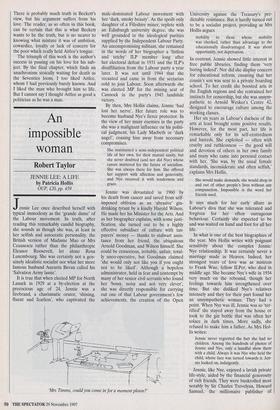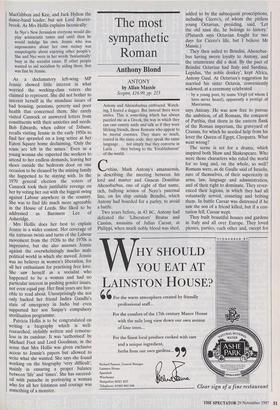An impossible woman
Robert Taylor
JENNIE LEE: A LIFE by Patricia Hollis OUP, £20, pp. 459 Jennie Lee once described herself with typical immodesty as the `grande dame' of the Labour movement. In truth, after reading this remarkably candid biography, she sounds as though she was, at least in her selfish and autocratic personality, the British version of Madame Mao or Mrs Ceausescu rather than the philanthropic Eleanor Roosevelt, let alone Rosa Luxembourg. She was certainly not a gen- uinely idealistic socialist nor what her more famous husband Aneurin Bevan called his `Salvation Army lassie'.
It is true that when elected MP for North Lanark in 1929 at a by-election at the precocious age of 24, Jennie was a firebrand, a charismatic orator, 'shining, fluent and fearless', who captivated the male-dominated Labour movement with her 'dark, smoky beauty'. As the spoilt only daughter of a Fifeshire miner, replete with an Edinburgh university degree, she was well grounded in the ideological purities supplied by the Independent Labour Party. An uncompromising militant, she remained in the words of her biographer a 'listless and tetchy' ILP member long after her electoral defeat in 1931 and the ILP's disaffiliation from the Labour party a year later. It was not until 1944 that she recanted and came in from the sectarian cold to join Labour. Soon afterwards she was elected MP for the mining seat of Cannock in the party's 1945 landslide victory.
By then, Mrs Hollis claims, Jennie 'had lost her nerve'. Her future role was to become husband Nye's fierce protector. In the view of her many enemies in the party she was a malignant influence on his politi- cal judgment, his Lady Macbeth or 'dark angel', coaxing him away from necessary compromises.
She maintained a semi-independent political life of her own, for their mutual sanity, but she never doubted (and nor did Nye) whose career mattered for the future of socialism. She was always there for him. She offered her support with affection and generosity, and Nye received it with tenderness and grace.
Jennie was devastated in 1960 by his death from cancer and saved from self- imposed oblivion as an 'abrasive' gin- drinking tyrant by a kindly Harold Wilson. He made her his Minister for the Arts. And as her biographer explains, with some justi- fication, she turned out to be a highly effective subsidiser of culture with tax- payers' money — thanks to stalwart assis- tance from her friend, the ubiquitous Arnold Goodman, and Wilson himself. She could be censorious, irritable, unfair, total- ly unco-operative, but Goodman claimed `she would only not like you if you ought not to be liked'. Although a hopeless administrator, held in fear and contempt by many of her senior civil servants who found her 'bossy, noisy and not very clever', she was directly responsible for carrying out one of that Labour government's few achievements, the creation of the Open Mrs Timms, could you come in fora moment please?' University against the Treasury's pre- dictable resistance. But it hardly turned out to be a socialist project, providing as Mrs Hollis argues
mobility to those whose mobility was checked, rather than advantage to the educationally disadvantaged. It was about opportunity, not deprivation.
In contrast, Jennie showed little interest in free public libraries, finding them 'very boring indeed'. Nor did she display concern for educational reform, ensuring that her cousin's son was sent to a private boarding school. To her credit she boosted arts in the English regions and she restrained her instincts for censorship, but she was unsym- pathetic to Arnold Wesker's Centre 42, designed to encourage culture among the working classes.
Her six years as Labour's duchess of the arts at least brought some positive results. However, for the most part, her life is remarkable only for its self-centredness and hatreds. She exploited — often with cruelty and ruthlessness — the good will and devotion of others in her own family and many who came into personal contact with her. 'She was, by the usual female standards, inconsiderate and often selfish,' explains Mrs Hollis.
She would make demands, she would drop in and out of other people's lives without any compunction. Impossible is the word her friends used.
It says much for her early allure as Labour's diva that she was tolerated and forgiven for her often outrageous behaviour. Certainly she expected to be and was waited on hand and foot for all her life.
In what is one of the best biographies of the year, Mrs Hollis writes with poignant sensitivity about the complex Jennie/ Nye relationship. It was certainly never a marriage made in Heaven. Indeed, her strongest years of love was as mistress to Frank Wise, fellow ILPer, who died in middle age. She became Nye's wife in 1934 very much on the rebound, though her feelings towards him strengthened over time. But she disliked Nye's relatives intensely and they for their part found her an unsympathetic woman. They had a point. When Nye was ill, Jennie was so 'ter- rified' she stayed away from the house or took to the gin bottle that was often her solace in dark times. More sadly, she refused to make him a father. As Mrs Hol- lis writes:
Jennie never regretted the fact she had no children. Among the hundreds of photos of Jennie and Nye, only a handful show them with a child. Always it was Nye who held the child, whose face was turned towards it. Jen- nie looked on, indulgently.
Jennie, like Nye, enjoyed a lavish private life-style, aided by the financial generosity of rich friends. They were bankrolled most notably by Sir Charles Trevelyan, Howard Samuel, the millionaire publisher of MacGibbon and Kee, and Jack Hylton the dance-band leader, but not Lord Beaver- brook. As Mrs Hollis explains laconically:
In Nye's New Jerusalem everyone would dis- play aristocratic tastes and until then he would indulge his own. Jennie who was unpossessive about her own money was unapologetic about enjoying other people's. She and Nye were in her words `fantastically' busy in the socialist cause. If other people wanted to aid socialism by aiding them, that was fine by Jennie.
As a declamatory left-wing MP Jennie showed little interest in what worried the working-class voters she claimed to represent. She did not bother to interest herself in the mundane issues of bad housing, pensions, poverty and poor health that concerned them. She rarely visited Cannock or answered letters from constituents with their anxieties and needs. Bob Edwards, when editor of Tribune, recalls visiting Jennie in the early 1950s to find her sprawled on a long settee at her Eaton Square home declaiming, 'Only the scum are left in the mines.' Even as a young woman she expected the workers to attend to her endless demands, leaving her shoes outside the bedroom door on one occasion to be cleaned by the mining family she happened to be staying with. In the 1970 general election the voters of Cannock took their justifiable revenge on her by voting her out with the biggest swing against Labour anywhere in the country. She was to find life much more agreeable in the House of Lords. She liked to be addressed as Baroness Lee of Asheridge.
Mrs Hollis does her best to explain Jennie in a wider context. Her coverage of the tortuous twists and turns of the Labour movement from the 1920s to the 1970s is impressive, but she also assesses Jennie against the overwhelmingly macho male political world in which she moved. Jennie was no believer in women's liberation, for all her enthusiasm for practising free love. She saw herself as a socialist who happened to be a woman and had no particular interest in pushing gender issues, not even equal pay. Her final years are hor- rible to read about. Unsurprisingly she not only backed her friend Indira Gandhi's state of emergency in India but even supported her son Sanjay's compulsory sterilisation programme. Patricia Hollis is to be congratulated on writing a biography which is well- researched, stylishly written and remorse- less in its candour. It was 'authorised' by Michael Foot and Lord Goodman, in the sense that Mrs Hollis was given exclusive access to Jennie's papers but allowed to write what she wanted. She says she found working on the biography 'very difficult', mainly in ensuring a proper balance between 'life' and 'times'. She has succeed- ed with panache in portraying a woman who for all her feistiness and courage was something of a monster.



















































































 Previous page
Previous page